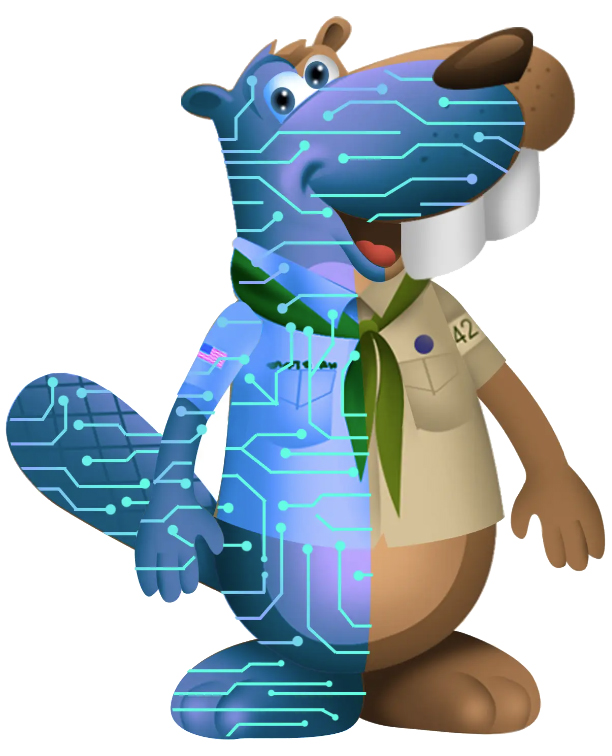Artificial Intelligence


There is no official Cybersecurity merit badge pamphlet.
Resources
Artificial Intelligence Requirements
Current Scouts BSA requirements
as of February 19, 2026
as of February 19, 2026
NOTE: The Artificial Intelligence (AI) merit badge has no merit
badge pamphlet. Instead, it has been designed for you to interact with
the
Scoutly
chatbot on your learning journey as you work through the requirements.
Scoutly can be found on the bottom right of your browser at
https://scouting.org.
If you have a question about a requirement, ask Scoutly! Hint: try asking Scoutly to Explain the "xxx" activity for requirement "yy" of the AI merit badge. This does not
replace the requirement to identify and work with a counselor to complete
the badge.
1.
Key Concepts. Define the following terms and share the meaning of
each with your counselor: artificial intelligence (AI), artificial
intelligence agents, automation, basic programming, bots, data, databases,
digital workers, general AI, machine learning (ML), narrow AI,
superintelligent AI, tasks, triggers, workflows, and variables.
2.
Artificial Intelligence (AI) Basics. Do the following and share
what you learned with your counselor:
a.
Identify 10 examples of how AI is currently used in everyday life.
b.
Identify five examples of how AI is currently used in the workplace.
c.
Identify five examples of how AI can be used at school or in support of
your education.
d.
Meet with your counselor and play ten rounds of the "AI or Not?"
game to determine if the presented scenario utilizes AI. Discuss
your answers.
e.
Create a timeline with five key milestones in the development of
artificial intelligence.
3.
Automation Basics. Do the following and share what you learned with
your counselor:
a.
Identify ten examples of how automation is currently used in everyday
life.
b.
Identify five examples of how automation is currently used in the
workplace.
c.
Identify five examples of how automation can be used at school or in
support of your education.
d.
Explain how automation performs repetitive tasks without human
intervention and how it reduces human error and optimizes resources.
e.
Create a timeline with five significant milestones in automation
development.
4.
Ethics in AI. Do the following and share what you learned with
your counselor:
a.
Research ethical concerns and responsible use in AI, including bias,
privacy, and AI decision-making.
b.
Meet with your counselor, play, and discuss five rounds of the "What
Would You Do?" ethical decision-making scenarios.
c.
Develop your own ethical guidelines for the use of AI.
d.
What is the Turing test?
5.
Deepfakes. Do the following and share what you learned with your
counselor:
a.
Explain what a deepfake is and how it can affect an individual.
b.
Describe what actions to take if you or someone you know is impacted
by a deepfake.
6.
Developing AI Skills. Do the following and share what you learned
with your counselor:
a.
Discuss the learning process for AI and its limitations.
b.
Identify five methods of how to effectively communicate with AI.
c.
Explain the importance of prompt engineering when using AI to create
better output.
d.
Demonstrate three examples of writing clear instructions for a
school-related task.
7.
Practical Application. Do ONE of the following:
a.
With your counselor's approval, choose an artificial intelligence
project based on your personal interest or a community need. Develop a
plan outlining the project's objectives, data requirements, and
potential ethical considerations. Implement the project utilizing
appropriate artificial intelligence tools, languages, or platforms.
Share your project with your counselor. Discuss the steps you followed
to create the project and your experience during the process.
b.
With your counselor's approval, design a short lesson plan on AI and
teach it to your patrol of a group of Scouts. The lesson should include
an AI-generated age-appropriate explanation of AI, examples of how AI is
used in both everyday life as well as in the workplace, and an
interactive demonstration of how Scouts could utilize AI to assist them
with a school assignment, Scouting activity, or rank advancement. Share
information on the development process and teaching experience with your
counselor.
8.
Career Exploration. Do ONE of the following:
a.
Identify three career opportunities that would use skills and
knowledge in artificial intelligence or automation. Pick one and
research the training, education, certification requirements,
experience, and expenses associated with entering the field. Research
the prospects for employment, starting salary, advancement
opportunities, and career goals associated with this career. Discuss
what you learned with your counselor and whether you might be interested
in this career.
b.
Interview an artificial intelligence or automation professional.
Learn about their day-to-day work, the challenges they face, and their
vision for the future of artificial intelligence or automation. Inquire
about training, education, certification requirements, experience, and
expenses associated with entering the field. Share what you learned with
your counselor.